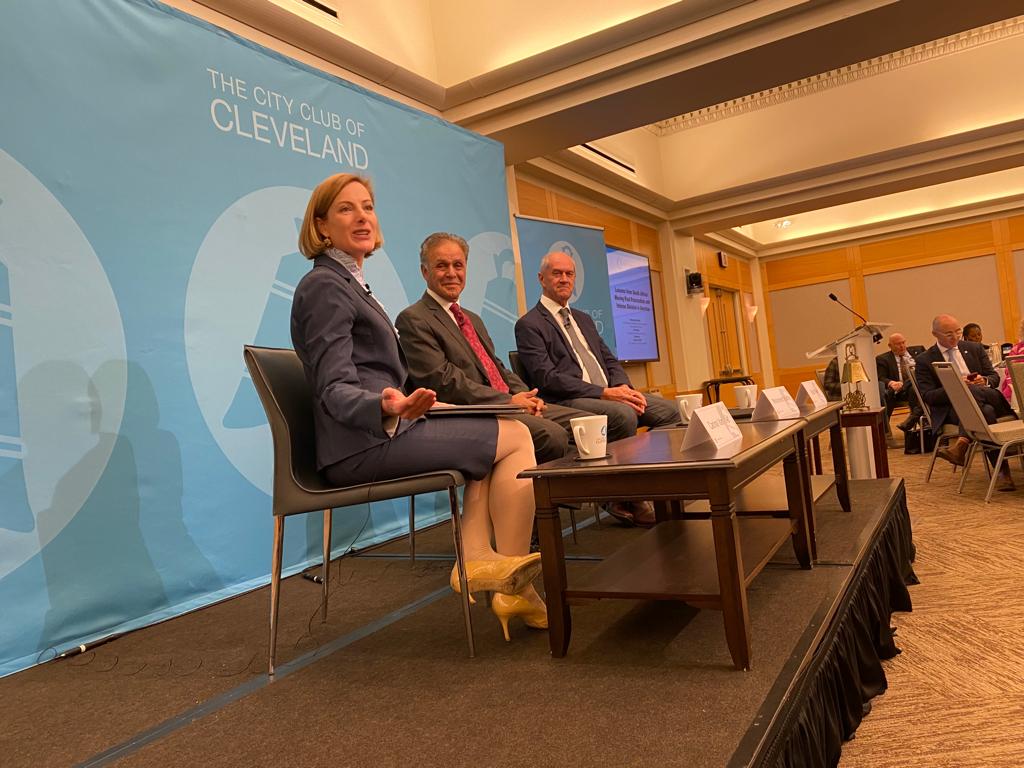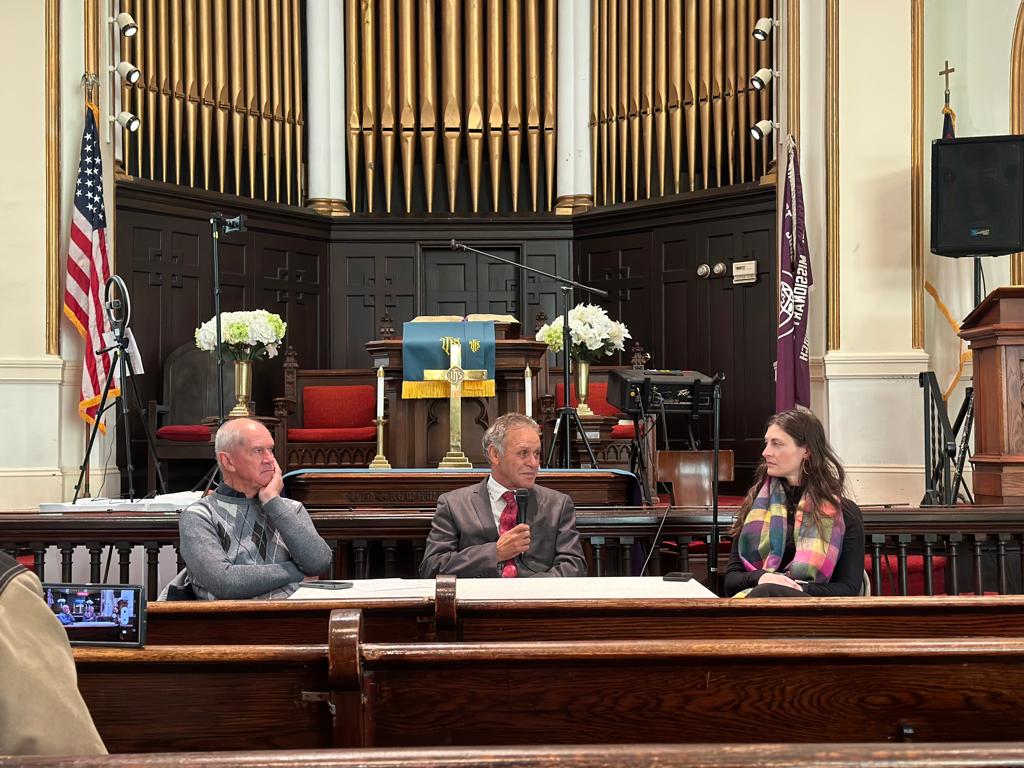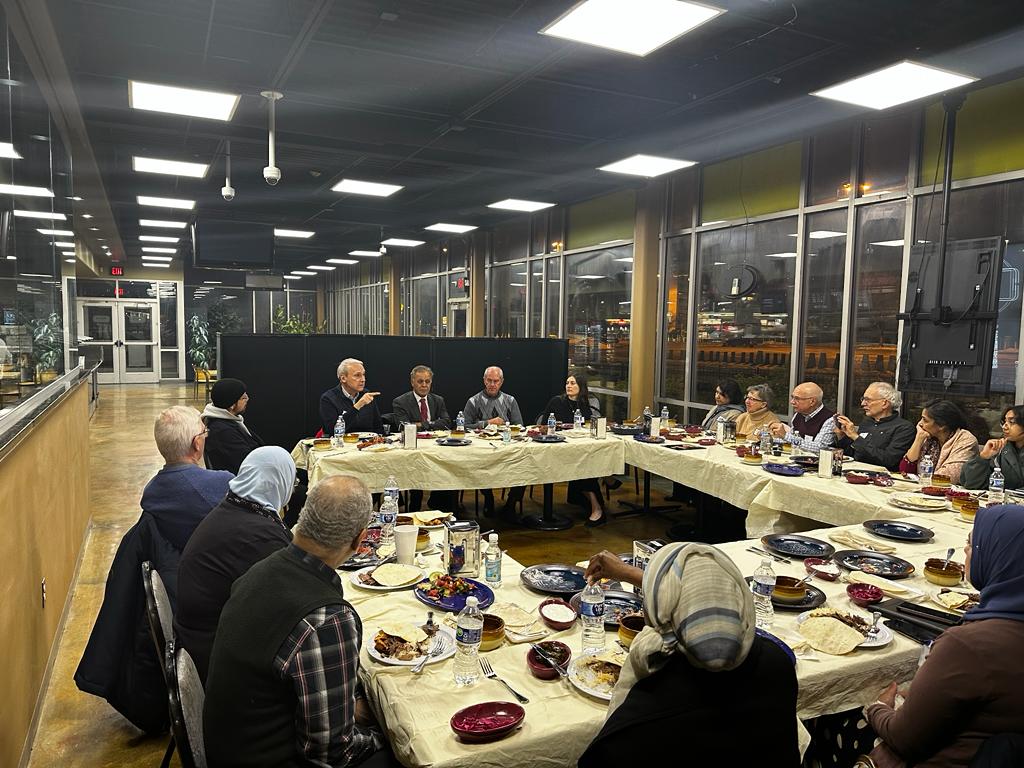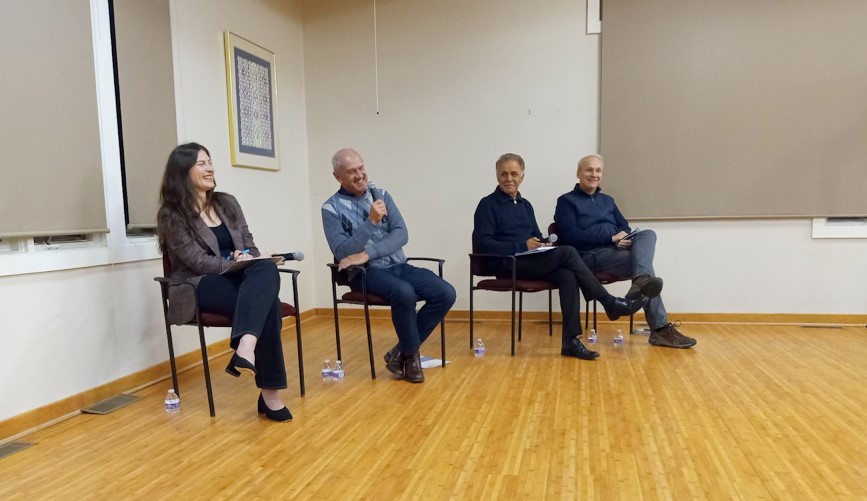At this time, America seems to be faced with immense polarization on many fronts and there may be several lessons to be learned from other countries that have in the past, faces similar challenges, including South Africa. From 24 to 30 January 2023, ITI Directors, Roelf Meyer and Mohammed Bhabha traveled to several cities in the United States including New York, Rochester, Cleveland and Washington D.C. to engage with serval stakeholders to discuss what solutions worked for countries like South Africa and what Americans may consider reconciling their own divisions.
Meyer and Bhabha’s experiences in being a part of the process to create a new system from the racist structure of apartheid rule were the subject of Lessons from South Africa: Moving Beyond Toxic Polarization in America, a local discussion sponsored by Rochester-based Civic Genius and Beyond Conflict, based in Boston. Through their knowledge and stories, both organisations hoped that individuals could apply some of these lessons to the current polarized political crisis in America and find a way forward together.
The pair also shared the South African experience on truth and reconciliation and engaged in discussions on what this could possibly look like in a country like America, with its own history of colonization and slavery.
Following decades of internal resistance, economic embargoes, and intensive internal negotiation processes, the system of apartheid ended in 1990 and a new government was formed, with the first democratic election taking place in 1994. While many issues persist in South Africa today, such as the nationwide power deficiency, corruption, and land reform, Bhabha still calls it a “miracle” that apartheid ended peacefully.
During their engagements, both Meyer and Bhabha agreed that there were three major elements that played a crucial role in the negotiation process. The first was that leaders on both sides were strong-willed but also gracious at giving up power. Former President of the National Party, F.W. de Klerk, initiated the end of apartheid and signed the order to release ANC leader Nelson Mandela from his 27-year imprisonment.
Meyer was quoted as saying: “One of the first things (Mandela) did was visit the widow of the man who had put him in prison. Just to have a cup of tea with her”. “Not a single moment ever, did he ever ask, ‘Why did you do this to me?’ He never touched that subject. He was always looking forward.” This graciousness extended to the political sphere where Mandela supported limiting the influence of a majority political party, conceding power that the ANC stood to gain.
The second element was taking an inclusive approach. Nineteen groups participated in CODESA and included those with seemingly small interests or populations. At the end of apartheid, white South Africans made up 13 percent of the total population. The 2022 midyear census estimates that the percentage has fallen by nearly half to 7.6 percent.
Bhabha indicated that although it was admittedly a long process, he learned as a student leader that white South Africans were acting out of fear and began to see them as victims of the system of apartheid as well.
The third element Bhabha and Meyer identified as crucial to their success was building trust across that divide, specifically by understanding the other side. For example, Bhabha said understanding Meyer and other white South Africans’ perspectives made it easier to connect with his political opponent.
“The fears Roelf had as a minority, I also had. And those fears were heightened (in his case), because of vindictiveness. If we can address those fears, understand those fears, and then find solutions to the fears, we can find the right way forward,” said Bhabha. “That epiphany only came with dialogue.
“We identified Roelf as one of the people we could rely on. When things got tough, and when the negotiation process was under threat, we knew he could be the bedrock we rely on. The others may waver, because there wasn’t a genuineness about them, it was pragmatism about them,” Bhabha continued, commending his friend for staying faithful even amid death threats from the right wing of his own people.
Looking back, Meyer says he is ashamed of previous statements he made, and that his paradigm shift did not happen overnight. He cannot pinpoint the day it happened, but sometime between the beginning of his political career and before Mandela’s release, Meyer found himself truly believing in dismantling apartheid.
“(For de Klerk), it was intellectually necessary, he could see the writing on the wall. But with different measures that one can apply, I can say, he never took it on as a real deep commitment,” Meyer said. “I keep arguing that, if you don’t have the commitment at the level of the soul, in your heart, if you’re not able to live that change, then it is not real.”
Moreover, Meyer and Bhabha explained that there may be many lessons that Americans take away, including how the pair who were once defined as “enemies” are now friends traveling the world, telling their stories. Meyer stated: “I’m not just using the word enemies in a light way. We were staunch enemies, we hated each other. The fact that we can sit here gives you that sense of hope that anything can be overcome,” Meyer said. “We loved our country. And whatever we did, in whatever approach we took, we made sure that the country comes first.”
Both Bhabha and Meyer indicated that they hoped attendees of the engagements would be able to walk away knowing change is possible.
“We’ve learned so much over the years from the U.S. I came here for the first time in 1982 and I’ve always been fond of the U.S. And what I think we have observed in recent times is that there are tensions like you have in all societies at some point of time. We are not free of tensions in South Africa for different reasons today, but I think it’s that experience that we have on how to move from real factionalism, dividing society towards a point where we’re working together for the better of the country as a whole. And I think that is what we would like to share from our experience and like a moment to say, ‘give hope that it can be done.’ If we could do it, then everybody else should do it,” Meyer said.
Meyer and Bhabha pointed out that every country’s reconciliation process is different and depends on where the fracturing comes from. However, Jillian Youngblood, executive director of Civic Genius, indicated that she sees the potential in their approach. Youngblood commented that in recounting their experience, both Meyer and Roelf expressed that the undercurrent of fear, from all directions was very prominent and it is precisely for this reason that hardy discussions about politics with someone who has a different opinion than you are necessary to address these fears and anxieties.





